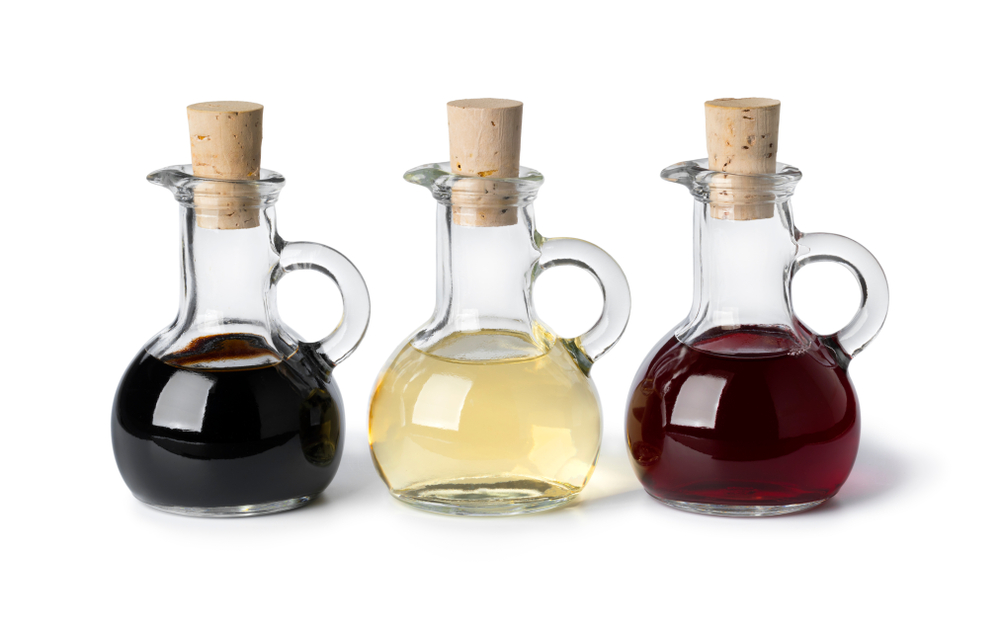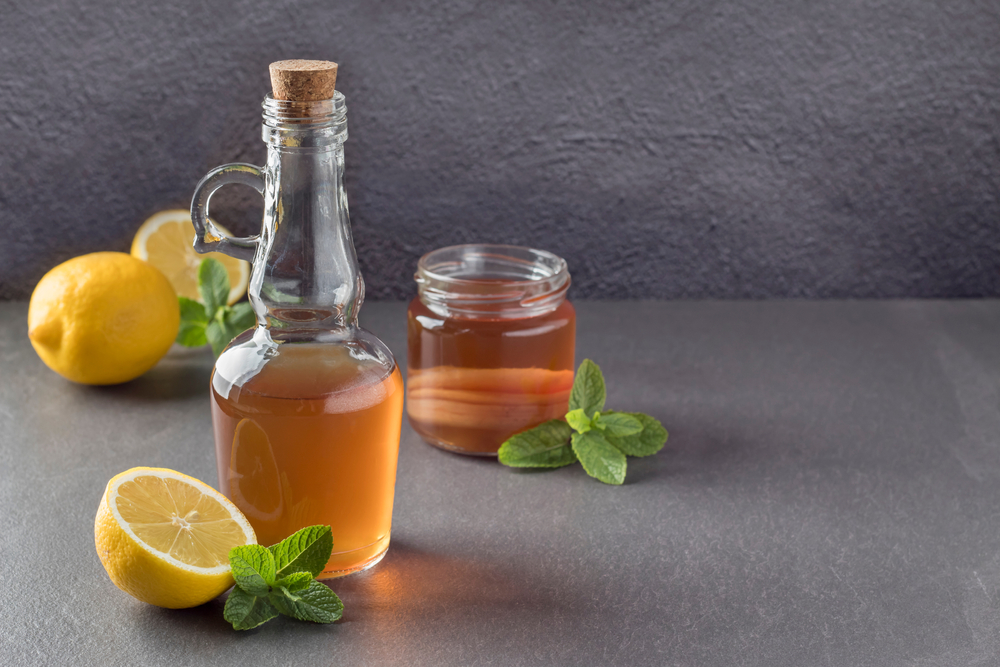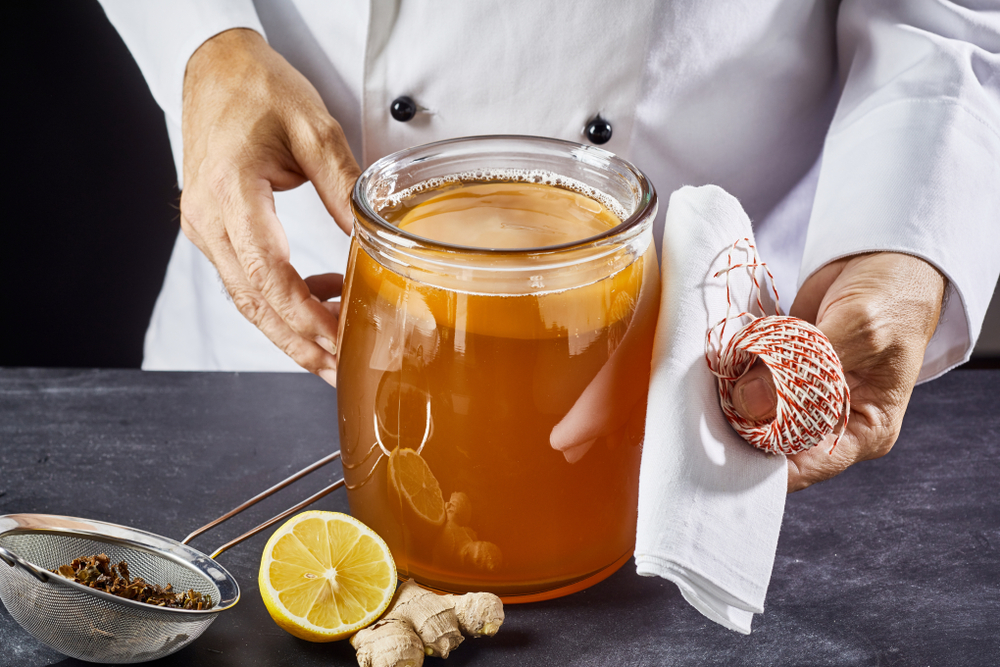Fermented kombucha, by nature, is going to have an acidic taste. However, if your kombucha tastes like vinegar, this may mean that your kombucha tea is fermenting for too long, or you have a more serious issue.
Table of Contents
Why Does My Kombucha Taste Like Vinegar?
There are numerous reasons why your kombucha might taste like vinegar, including the following:
- Too much SCOBY: The SCOBY (symbiotic culture of bacteria and yeast) is what creates acetic acid in your kombucha. If you have excess SCOBY, your batch of kombucha may be overly acidic, leading to an unpleasant vinegar taste.
- Fermented for too long: This is one of the most likely reasons your kombucha tastes like vinegar. If you leave your kombucha to brew too long, the pH levels will be thrown off, giving it an acidic taste.
- Bacterial contamination: Besides the fact that it can be dangerous to consume contaminated kombucha, it can also give your brew an unpleasant vinegary taste. Usually, bacterial contamination is caused by using unclean equipment or water high in chlorine or chloramine.
- Wrong temperature: The warmer the temperature where you brew kombucha, the faster it ferments. If you leave your kombucha brew in a warm place for too long (even if it is the recommended amount of brewing time), it will likely taste vinegary.
On the other hand, if the temperature is too low, the microbes will become dormant, and fermentation will not occur. The brew’s temperature is an essential part of the fermentation process and can determine how well your booch turns out and whether or not it has a vinegary taste. - The wrong type of sugar: When it comes to sugar, most people think that using unprocessed, organic sugar such as muscovado, panela, or rapadura means your kombucha will be even healthier. However, these sugars don’t work as well with the SCOBY to ferment, meaning the SCOBY will have to work extra hard. Because the SCOBY is working so hard to ferment, it may create a vinegary taste.
Another type of sugar to avoid is caster sugar. This is a highly refined sugar that the SCOBY consumes too quickly, leaving your kombucha vinegary because nearly all the sugar will be converted into organic acids.
You should only use cane sugar in the first fermentation.
What Is the Difference Between Kombucha and Vinegar?
While kombucha breaks down sugars in sweet tea and turns them into carbon dioxide, vinegar (specifically apple cider vinegar) has a much higher concentration of acetic acid, and no bubbles, because of the ethanol present during anaerobic breakdown. In turn, the two liquids have quite a few differences:
| Kombucha | Vinegar |
| Has approximately 1% acetic acid | Has about 5% acetic acid |
| Fizzy and slightly sweet | Flat and not enjoyable to drink |
| Made from black or green tea | Many production processes, but never with tea |
| Yeast and kombucha cultures are always present | Does not contain yeast cultures |
| Ferments for about 10 days | Ferments for approximately 50 days |
| Usually sold raw and unpasteurized | Usually pasteurized before sold |
Both kombucha and vinegar have several health benefits, including probiotics, though kombucha tends to contain more.

Can Kombucha Turn Into Vinegar?
If kombucha is left to ferment too long, it can eventually turn into kombucha vinegar. If your kombucha ferments for at least 30-60 days, the liquid will grow sourer and the vinegary flavor sharper until it can be classified as kombucha vinegar, with 2-3% acetic acid.
Though regular kombucha always has a slightly vinegary taste, it is not classified as vinegar, and those that drink kombucha regularly will eventually get used to the sour taste. However, if your kombucha tastes too sour, this is a good indicator that it has been fermenting for too long, and you likely won’t enjoy drinking it.

How Can I Save a Batch of Vinegary Kombucha?
If your homemade kombucha has turned into kombucha vinegar, there are multiple ways to use it. Try one of the following:
- Water it down. This will dilute the drink and the acid, though it will likely still have a bite.
- Add something alkaline, such as calcium carbonate. Adding an alkaline will neutralize some of the acidity and improve the taste.
- Add pureed fruits, fruit juices, honey, or sweeteners. These flavors will help balance out the bite of the acids.
- Embrace the kombucha vinegar. Use it as a strong starter tea for your next batch, as a marinade for proteins or veggies, as a hair wash or rinse, to make a salad dressing or other sauces, as a cleaning fluid, or for pickling vegetables.

